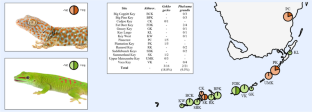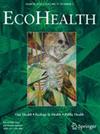佛罗里达州南部非本地壁虎的肠炎沙门氏菌感染
IF 2.2
3区 环境科学与生态学
Q3 ENVIRONMENTAL SCIENCES
引用次数: 0
摘要
野生壁虎是人类沙门氏菌病的重要传染源。我们对来自美国佛罗里达州南部的 37 只非本地同种壁虎(Gekko gecko,n = 16;Phelsuma grandis,n = 21)的泄殖腔进行了拭擦,并使用 invA 基因的定量聚合酶链反应对拭擦 DNA 提取物进行了检测。在这两个物种中都检测到了肠炎沙门氏菌,总流行率为 13.5%(5/37;95% CI 5.3-27.1%),表明有可能发生人畜共患病传播。本文讨论了该地区人类健康的影响。本文章由计算机程序翻译,如有差异,请以英文原文为准。

Salmonella enterica Infection of Synanthropic Non-native Geckos in Southern Florida
Wild geckos are a significant source of human salmonellosis. We swabbed the cloacas of 37 non-native synanthropic geckos (Gekko gecko, n = 16; Phelsuma grandis, n = 21) from southern Florida, USA, and assayed swab DNA extracts using quantitative polymerase chain reaction of the invA gene. Salmonella enterica was detected in both species with a pooled prevalence of 13.5% (5/37; 95% CI 5.3–27.1%), indicating the potential for zoonotic transmission. Implications for human health in the region are discussed.
求助全文
通过发布文献求助,成功后即可免费获取论文全文。
去求助
来源期刊

Ecohealth
环境科学-环境科学
CiteScore
4.50
自引率
4.00%
发文量
45
审稿时长
>24 weeks
期刊介绍:
EcoHealth aims to advance research, practice, and knowledge integration at the interface of ecology and health by publishing high quality research and review articles that address and profile new ideas, developments, and programs. The journal’s scope encompasses research that integrates concepts and theory from many fields of scholarship (including ecological, social and health sciences, and the humanities) and draws upon multiple types of knowledge, including those of relevance to practice and policy. Papers address integrated ecology and health challenges arising in public health, human and veterinary medicine, conservation and ecosystem management, rural and urban development and planning, and other fields that address the social-ecological context of health. The journal is a central platform for fulfilling the mission of the EcoHealth Alliance to strive for sustainable health of people, domestic animals, wildlife, and ecosystems by promoting discovery, understanding, and transdisciplinarity.
The journal invites substantial contributions in the following areas:
One Health and Conservation Medicine
o Integrated research on health of humans, wildlife, livestock and ecosystems
o Research and policy in ecology, public health, and agricultural sustainability
o Emerging infectious diseases affecting people, wildlife, domestic animals, and plants
o Research and practice linking human and animal health and/or social-ecological systems
o Anthropogenic environmental change and drivers of disease emergence in humans, wildlife, livestock and ecosystems
o Health of humans and animals in relation to terrestrial, freshwater, and marine ecosystems
Ecosystem Approaches to Health
o Systems thinking and social-ecological systems in relation to health
o Transdiiplinary approaches to health, ecosystems and society.
 求助内容:
求助内容: 应助结果提醒方式:
应助结果提醒方式:


